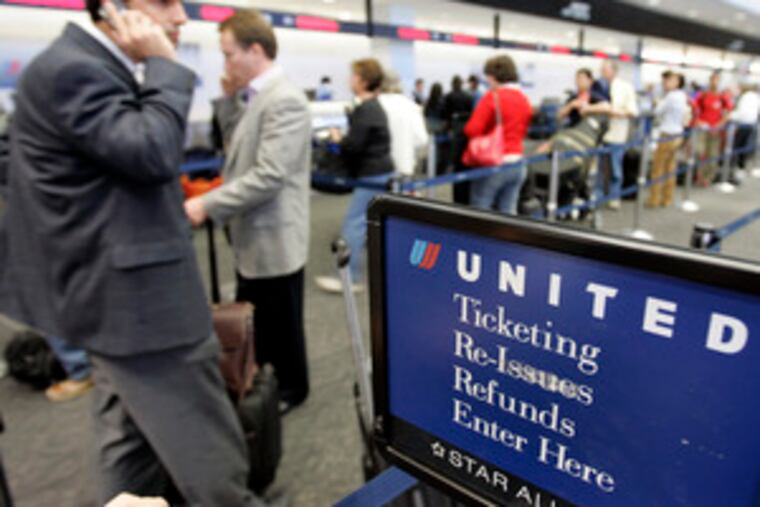United Airlines to cut fleet and jobs
Get ready for even more crowded planes, still-higher fares - and fewer choices of when to fly, and where. The latest crunch came yesterday, when United Airlines announced that it would cut up to 1,600 jobs, reduce its fleet by 100 aging and fuel-inefficient planes, and slash domestic capacity - seats - to save fuel.

Get ready for even more crowded planes, still-higher fares - and fewer choices of when to fly, and where.
The latest crunch came yesterday, when United Airlines announced that it would cut up to 1,600 jobs, reduce its fleet by 100 aging and fuel-inefficient planes, and slash domestic capacity - seats - to save fuel.
The good news here is that United, the nation's second-largest airline, operates only 20 flights a day from Philadelphia International Airport.
The other good news: Fall airline schedules show that Philadelphia's overall domestic capacity will be up 1 percent in November, compared with November 2007, said James M. Tyrrell, the city's deputy director of aviation.
While most major airlines are making modest cuts in the number of their domestic flights, Philadelphia has been spared dropped routes and slashed flights that some small and midsize cities will experience, according to data provided by airlines.
United will reduce 27 percent of its available seats out of Philadelphia, according to schedules for November. The airline, which is based in Chicago and owned by UAL Corp., will cancel seven Los Angeles flights and three Chicago flights per month - 10 of its 600 monthly flights here, Tyrrell said.
United operates 16 mainline and four regional flights a day between Philadelphia and Chicago, Denver, Los Angeles, Washington and San Francisco.
Philadelphia acting aviation director Charles Isdell said that even if United "shut everything down here," the impact would be minimal because the airline carries only about 4 percent of Philadelphia passengers.
But the scheduled cuts will mean that if you are flying United to Chicago, the planes will be full, he said.
"There were no destinations cut, just the number of frequencies to those destinations," Tyrrell said.
Overall, Philadelphia will see a 1 percent increase in airplane seats compared with last November.
US Airways Group Inc., which carries two-thirds of Philadelphia passengers and flies to 160 destinations, announced few preliminary schedule changes for fall - a decrease in flights to Hartford, Conn., but more flights to Seattle and Boston, Tyrrell said.
Southwest Airlines Co., which flies about 12 percent of Philadelphia passengers, plans to add flights to Austin, Texas; Denver; San Antonio, Texas; Las Vegas; Orlando; Tampa, Fla.; and St. Louis. It will decrease flights to Fort Lauderdale, Fla.; Houston; Pittsburgh; and Chicago's Midway Airport.
"We are one of the few airports in this country that can boast" an increase, Tyrrell said. "Most airports are looking at cuts in capacity."
Philadelphia draws from a large metropolitan area and is a strong "origin and destination" city. It benefits from being a hub for US Airways and a gateway for international travel to Europe and the Caribbean, airport officials said.
With $130-a-barrel oil, all airlines are struggling to survive soaring fuel prices by cutting capacity and jobs, and by charging passengers extra fees for everything from checked bags to pets.
United is the latest to announce cuts, but it will not be the last, analysts said.
Spirit Airlines Inc., a low-fare carrier based in Florida, announced yesterday that it might lay off 416 workers Aug. 1 if fuel continued to rise. American Airlines said May 21 that it would reduce capacity by 11 percent to 12 percent in the fourth quarter. American also said it would begin charging passengers $15 for a first checked bag.
Low-fare carrier AirTran Airways said last week that it would defer delivery of 18 Boeing Co. jets and halt plans for growth in 2009.
United plans to ground its entire fleet of 94 Boeing 737s and six 747s, its oldest and most fuel-inefficient planes. It previously had announced it would retire 30 of the jets and cut 500 jobs. United also is scrapping its coach-only "Ted" service and reconfiguring those planes to include first-class seats.
"UAL's decision to cut unprofitable flying is good," Credit Suisse Group airline analyst Daniel McKenzie said in a research note. "Airlines are highly leveraged, and a wrong strategic decision today could have Chapter 11 implications tomorrow."